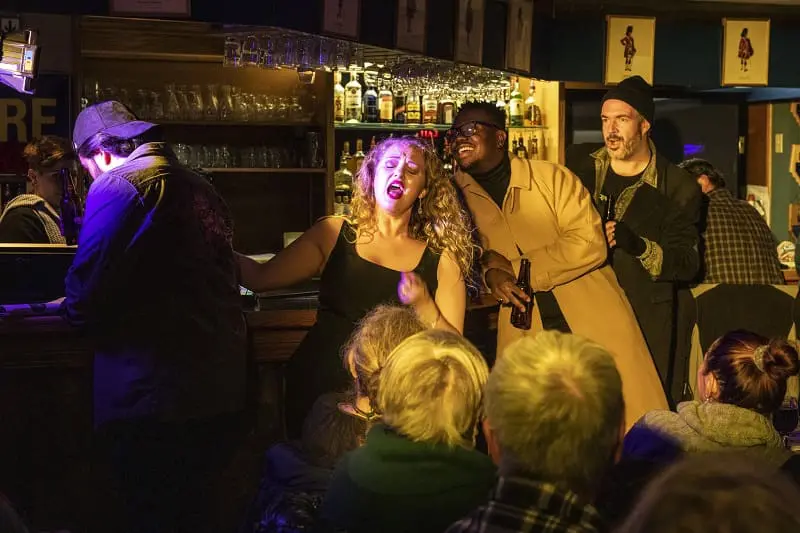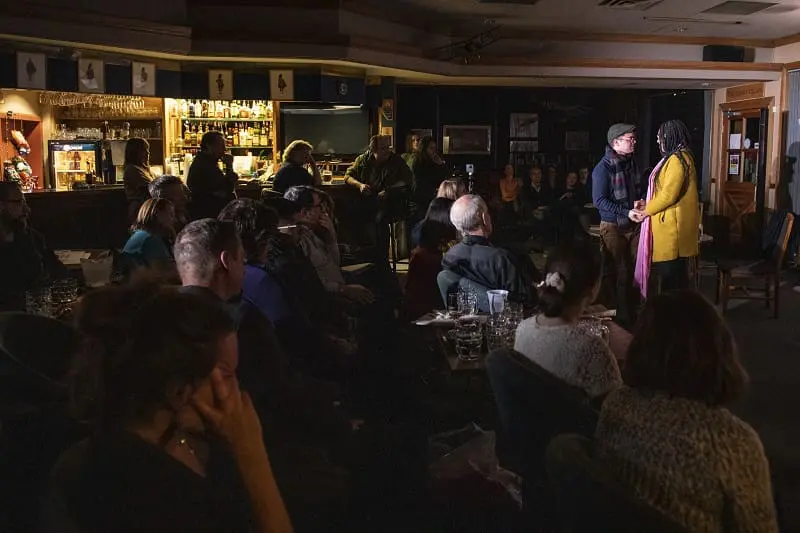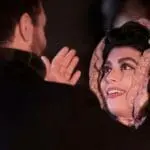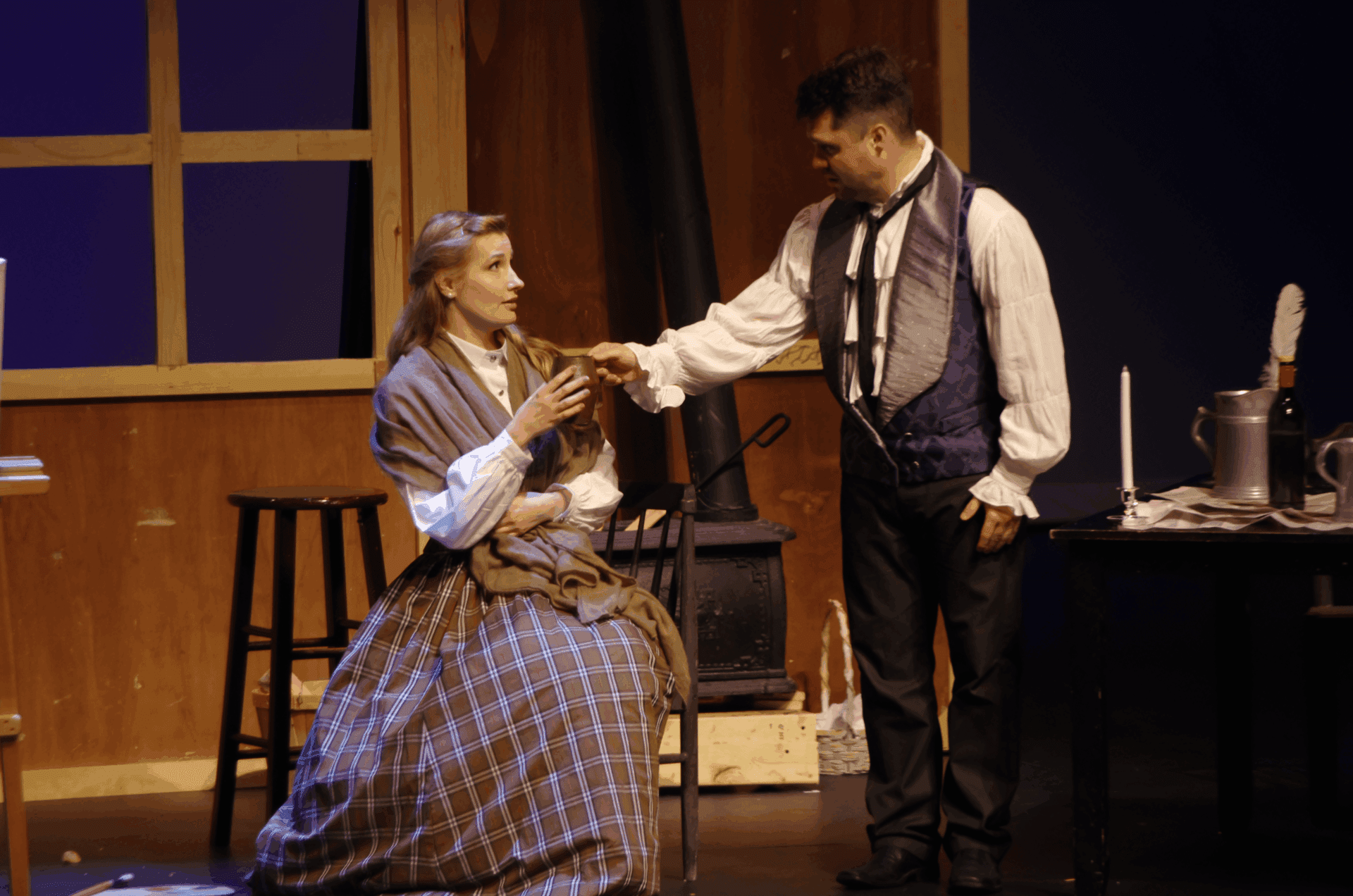Against the Grain Theatre’s La bohème feels like a cult movie that everyone’s heard of but no one has actually really seen. Like Game of Thrones or Hamilton, a shared cultural osmosis sparks déjà vu as Rodolfo mourns Mimì’s lifeless form, or as Schaunard boasts of killing a dog for coin. And, I mean, that’s sort of to be expected with La bohème, but AtG’s version draws on its cultural approximation with RENT more than most by updating the original piece with an all-English libretto, transposing characters from 19th-century Paris to present-day Toronto, and trading petticoats and top-hats for flannel and Blue Jays caps.
It is a reimagining that (mostly) works.
AtG’s La bohème is in the middle of a cross-Canada tour. Adopting a punk-rock touring philosophy apt for its staging, the show was dutifully shoved into a van and hauled across Alberta, Saskatchewan, Manitoba, back to Ontario before concluding in Yukon next month. I had the opportunity to watch the show (Oct. 16th) on its home turf of the Tranzac Club, where the adaptation originally premiered in 2015 and, presumably, the space where the staging is most suited. It’s hard to appreciate the Olympian challenge of re-staging for a new bar in a new city every night, especially given that even at Tranzac home base, singers were a hair’s breadth away from tackling audience members, but the rough and tumble is part of what makes this Bohème so great. The audience is packed cabaret style, squirming and screeching their chairs awkwardly in a semi-claustrophobic space fitting as Rodolfo’s cramped, over-priced Bloor St. apartment. Minimalism is the name of the game, with the most lavish set choice being a backdrop comprised of pages from Marcello’s sketch-journal representing the frigid snow. While it’s not the most effective way of conveying the dreary cold haranguing our heroes, it offers a more imaginative scene than just paper snowflakes.
The real star however is the bar, which director Joel Ivany makes use of to full effect. Doubling as both a bar for the audience and as stage, our lovable cast of misfit artists run amok over countertops and between tables, bellowing arias through mists of spit beer that gently nestle atop the audience, who they also pester for spare change. Was it overwhelming? Yes. Could some hapless audience member end up slamming into the chorus? Also yes. But hot damn it works! Being arm’s length from a professional opera singer going full-throttle is thrilling, especially when Danika Lorèn struts out as Mussetta; both she and Greg Finney as Benoît/Alcindoro are delightful. Lorèn unapologetically owns the stage during her introductory aria, and oozes so much charisma she leaves a sense of elation lingering for rest of the show.
The rest of the performances, while perhaps not as show-stealing, merit praise nonetheless. Marcel d’Entremont is a deft Rodolfo. His vocal elasticity demands attention as it explodes in volume and depth at the drop of a hat. Clarence Frazer’s Marcello, while less flashy, acts as vocal workhorse: his baritone provides a firm musical foundation and booms rapprochement to Rodolfo with believable authority. Andrew Adridge and Giles Tomkins were just hammy enough as Schanaurd and Colline, goofing it up without getting distracting. As Mimì, Jonelle Sills seemed a tad strained, especially when grasping at higher notes where her voice fell to the back of her throat rather than projecting outward. However she makes the character her own, taking an otherwise meek persona and imbuing her with a sweet flirtatiousness that allows the relationship with Rodolfo to feel genuine. More importantly, it brings Mimì ‘in on the joke’ during Rodolfo’s flirting rather than relegating her to a cipher of creepy courtship. It’s a wonderful choice and Sills nails it. Special kudos should also be given to David Eliakis, who single-handedly carries the musical accompaniment on his ivory-bruised fingers. When he demands a shot of tequila I was of half a mind to buy him one.

Left to right: Clarence Frazer (Marcello), Danika Lorèn (Musetta), Andrew Adridge (Schaunard) & Giles Tomkins (Colline) in AtG’s La bohème.
The updated libretto works despite, or perhaps because of, the self-serving winks to ‘Trawnah.’ Cute is the operating word, and I mean that in a good way, even if the setting occasionally creaks and strains against the anachronism of its transposition. While parallels can be found between both settings, the kind of abject destitution of 19th-century France is just not the same as that of contemporary Canada, at least not for struggling artists. This chronological displacement really comes to a head during Mimì’s death from a nameless cough (consumption is so 1896, daddy-o), and characters have to unironically suggest calling for a doctor as though streetcars are teaming with physicians in plague-masks. An update to, say, present-day America, where Mimì has no insurance would have worked but this adaptation is so Torontonian it might as well piss Steam Whistle, so the convenient omission of socialized healthcare was immersion shattering. Although not as shattering as the aggressively tacky Donald Trump joke, which had all the seamless delivery as a punch to the kidney. Whoever thought it was a good idea to include this zinger, one about sexual assault at that, was grossly mistaken and it deserved every single awkward chuckle and world-weary groan it got.
Look I could spend the better part of this review ranting about that one line (because, I mean, yikes) but the truth is some growing-pains in adaptation aside, what AtG has in La bohème is special. Puccini’s tragic ode of solidarity to the starving artist belongs less in the opulent opera houses of Europe than in the pub among those to whom it is most relevant. It is in that spirit that all the references to Bloor Street, to the Leafs, to condo developments and crushing rent find its place. One can accuse the production of pandering but it works, and charges its performers with electrifying familiarity. It is a fun show, and is sure to find a warm reception in the chilly bars of the Yukon next month.















